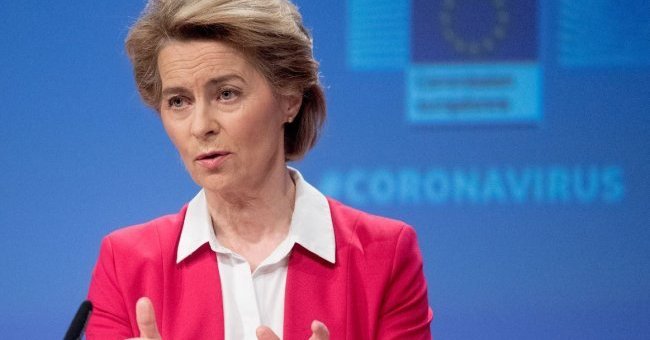Gathering European resources
This new aid plan, formally announced on 2nd April during a press conference, far outstrips earlier measures.
To recap, the European Commission had announced on 25th March that it would free up €37 billion from their investment budget to fight against the economic impact of coronavirus, specifically targeting European regions which need it the most. By mid-March, the European Central Bank (ECB) had launched a shares buyback program, equivalent to €750 billion. The European Commission also suspended the 3% government deficit maximum which usually applies to members of the Eurozone and approved aid every day to states for the fight against coronavirus.
This arsenal of European financial aid is the form that EU aid to member states has taken, alongside logistical help, like a reserve of €50 million worth of medical equipment, aid for the repatriation of Europeans abroad with RescuEU or even the funding of collaborative medical research on coronavirus.
An important step in pooling European guarantees
The SURE programme presented on 1st and 2nd April is a simple mechanism to aggregate financial guarantees of member states. It functions like the Juncker plan, launched in 2015, which provided €315 billion in investments over 2 years. Though the Juncker plan and the SURE programme (Support to mitigate Unemployment Risks in Emergency), work in the same way, the new plan combines member states’ guarantees, to start pooling of their budgets.
The Juncker plan was based on the initial guarantee of only €21 billion to ultimately achieve leverage to the tune of €315 billion. The €21 billion were based on the EU’s valuable guarantee since the EU has no debt and is not in deficit. The €21 billion were to provide 63 billion in loans to then lead the private sector to guarantee up to €315 billion; a financial leverage 15 times bigger than the original investment. This plan was so successful that it went on to generate almost €500 billion by the end of 2019.
The SURE programme is effectively a pooling of funds from member states, who will provide 25 billion euros to meet a total of €100 billion in aid, specifically intended for partially unemployed Europeans. These funds will be primarily destined for the most affected regions such as Italy and Spain. In its 2020 work programme, the EU aimed to offer integrated unemployment insurance systems on a European level.
Two important stages have therefore been passed by pooling a part of the state members’ guarantees to develop a European unemployment insurance system. The SURE programme, as presented by the European Commission, aims to protect the pillars of the European economy currently under attack, and to help economic centres such as Madrid and Milan.
All in all, the EU’s aid plans to help its member states total a record amount of €2,770 billion.
A new and much larger European budget for European recovery
Finally, during the press conference on the 2nd April, President of the European Commission Ursula von der Leyen announced a ‘Marshall Plan’ for the aftermath of the health crisis. And, as requested by French President Emmanuel Macron, the European Commission is preparing to dedicate a significant amount of the European budget to rebuild the European economy.
A few weeks from now the European Commission will put forward a new budget proposal for 2021-2027. The current proposal, presented in 2018, is still €1,000 billion, which is meant to last 7 years, and is equal to 1% of European GDP. We can therefore expect a much more ambitious proposal than the 1.3% requested by the European Parliament in this new announcement.
The European Union, whatever is being said about it, is therefore responding to the crisis in a more than satisfactory and responsible way.

Follow the comments: |
|
